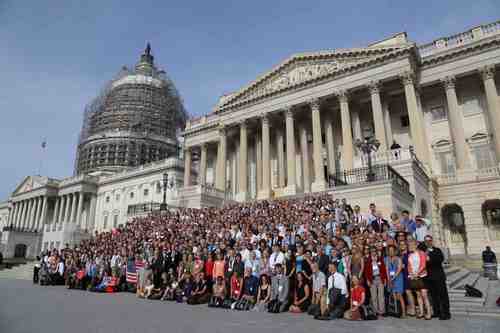Here's what we know about climate change: Ninety-seven percent of climate scientists are convinced, based upon the evidence, that human-caused global warming is happening.
The popular narrative in the media these days, however, is that Republicans in Congress don't accept this fact and that the GOP is in denial about the science around climate change.
Well, I have some surprising news: Everything you think you know about Republicans and climate change is a myth that I will now explode.
CCL volunteers converge at the Capitol for lobby day to meet with congressional offices.
Our organization, Citizens' Climate Lobby, recently sent 800 volunteers to meet with more than 500 House and Senate offices in Washington. This was our opening in those meetings:
"We're here to talk about a policy that can grow the economy, add jobs, increase our competitiveness with China, and make our air and water cleaner."
That policy, our volunteers would go on to explain, is to place a gradually rising fee on carbon and return the revenue to households. They also shared the results of a nonpartisan study that found that such a policy would cut CO emissions in half within 20 years, while adding 2.8 million jobs to the economy and saving 13,000 lives annually because of reduced air pollution.
So what happened when our volunteers engaged Republicans in this conversation?
In most instances, there was keen interest, active listening, productive discussions and -- in some cases -- expressions of support for our proposal. In very few instances, however, was there pushback from the staff or member of Congress about the science of climate change.
In meeting after meeting with Republican offices, the unspoken agreement seemed to be: "Let's not argue about the science; let's talk about solutions and where we might find common ground."
But what about everything we're hearing on TV and reading in newspapers about Republican presidential candidates pushing back on the pope's encyclical? What about a certain member of Congress who tossed a snowball on the Senate floor to dispute global warming?
These are the more sensational reactions that make the news because the media thrives on conflict. No conflict means no news.
Despite the headlines, CCL has found in the past year that the propensity among congressional Republicans to dispute climate science has waned considerably. So why has that changed, and why were we ever arguing the science to begin with?
The answer, I believe, lies with the solutions being proposed, which all involved more government, more red tape and more regulations -- things that are anathema to conservatives. Whether it was the 1,400-page cap-and-trade bill that failed to pass the Senate or the current Clean Power Plan to regulate carbon dioxide at electrical plants, Republicans aren't seeing solutions to climate change that they can readily embrace.
Don't like the solutions? Don't admit that there's a problem.
But what if there were a solution in harmony with the conservative values of less government and doing things that grow the economy, a market-friendly approach that doesn't dictate which technologies win or how we should conduct our lives?
Such a solution exists with Carbon Fee and Dividend, the policy I described earlier. By returning all revenue from the carbon fee to households, we accomplish two things: We keep the federal government from getting bigger, and we add jobs by putting money into the pockets of people who will spend it.
Republicans, by and large, like the sound of that, and a funny thing is happening as our volunteers talk to more and more members of Congress. The conversation is shifting away from the so-called "debate" about climate change and toward finding suitable ways to address the problem.
The premise that Republicans can talk about solving climate change comes as no great shock when you consider the following:
- During his presidency, Theodore Roosevelt protected approximately 230 million acres of public land.
So everything you think you know about Republicans and climate change is, for the most part, wrong. The chance that Republicans will lead on this sooner rather than later has never been more obvious.
And if Republicans are looking for a dramatic moment to lead on climate change, Sept. 24 -- the day Pope Francis speaks to Congress -- would be the perfect time to introduce a Carbon Fee and Dividend bill.

